Items
Tag is exactly
migrant
-
 2023-05-16
2023-05-16News Article Analysis: India Is What Happens When Rich People Do Nothing
I will analyze this article focusing on the devastating impacts of the Covid-19 pandemic, including exploitation of marginalized groups like migrant workers, oxygen and other medical resource shortages, and the overall structural consequences of poor governance and health infrastructures in India. Not only does the writer Krishnan cater to the failures of the current Indian federal government during the pandemic, but he aims to point out the great moral failure of our whole generation, which has exposed the long-existing structural issues in providing for public healthcare and social security of Indian citizens. -
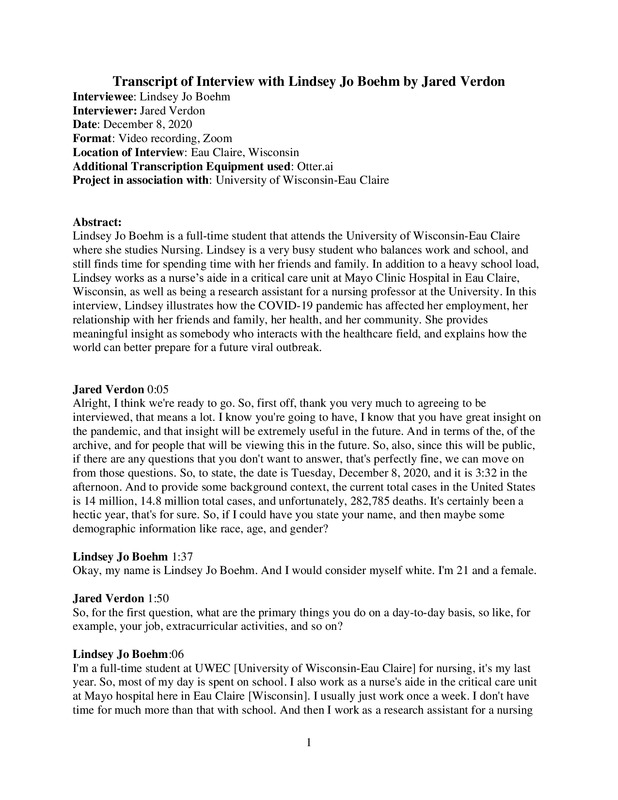 12/08/2020
12/08/2020Lindsey Jo Boehm Oral History, 2020/12/08
Lindsey Jo Boehm is a full-time student that attends the University of Wisconsin-Eau Claire where she studies Nursing. Lindsey is a very busy student who balances work and school, and still finds time for spending time with her friends and family. In addition to a heavy school load, Lindsey works as a nurse’s aide in a critical care unit at Mayo Clinic Hospital in Eau Claire, Wisconsin, as well as being a research assistant for a nursing professor at the University. In this interview, Lindsey illustrates how the COVID-19 pandemic has affected her employment, her relationship with her friends and family, her health, and her community. She provides meaningful insight as somebody who interacts with the healthcare field, and explains how the world can better prepare for a future viral outbreak. -
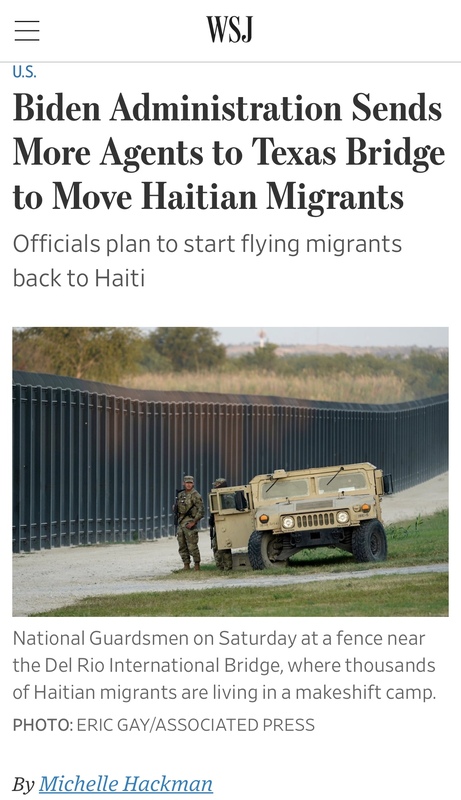 2021-09-18
2021-09-18Biden Administration Sends More Agents to Texas Bridge to Move Haitian Migrants
It is utterly dismal that this is taking place, and being written about, as if it were compartmentalized from the crisis of mass death facing the entire planet. Face masks are required on all U.S. public transit and on all flights, yet migrants seeking asylum are treated without regard for even their bare minimum safety. -
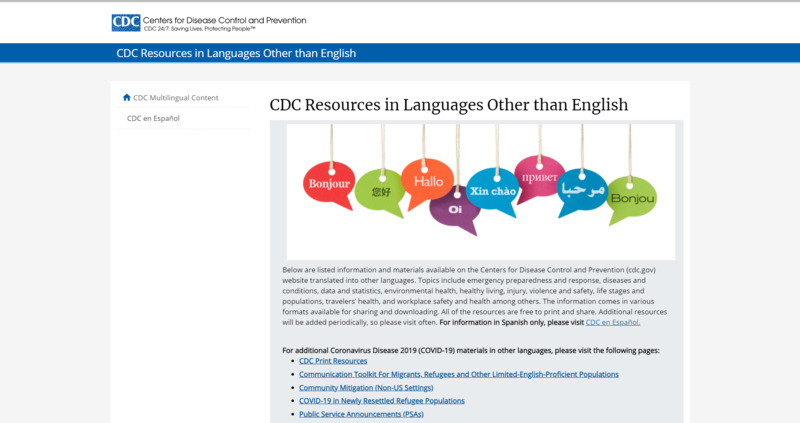 2021-07-22
2021-07-22CDC Resources in Languages Other Than English
Information on COVID-19 must be available to all individuals if the US as a society and as a country are to successfully deal with this virus and prevent deaths and illness. This information must be available in a variety of languages other than English to meet the needs of those who are not proficient in the English language. The CDC created a website with a wealth of information and materials for individuals in languages other than English, including materials for migrants and refugees. The CDC also has a website for Spanish-speaking individuals. -
2020-11-09
HIST30060
1. The Trump family contracting Covid When my friend first texted me about Donald and Melania Trump contracting Covid-19, I let out a hysterical laugh. To me, it wasn’t Trump, the person, contracting the virus that was funny but rather Trump, the one who belittled the effects of the virus and avoided taking meaningful measures to minimise its impact, that was funny. It was a stark reminder that boundaries between the powerful and the powerless, between the wealthy and the disadvantaged, between the authorities and the ones subject to authority, between varying socioeconomic standings can be blurred, especially in the case of a global pandemic. While pandemics have an undeniable impact on the disadvantaged or those with lower socioeconomic means, its impact on a figure such as Trump somewhat demonstrated that no one is beyond a virus. 2. Stigmatising Migrant Communities in Victoria When the second outbreak unfolded in Victoria, it was really interesting to, firstly, see the socioeconomic inequalities come into light and, secondly, the Victorian migrant communities framed as the problem. They were projected to be the cause of the second outbreak in Victoria which prompted the media to monopolise on this racist and bigoted rhetoric of migrants causing trouble. The media and some members of the public (through social media) insinuated that migrant communities’ culture was, by default, antithetical to the Australian way of life and thrust Victoria into another lockdown. It later became clear that the Victorian government’s hotel quarantine disaster prompted a second outbreak. The security personnel and other staff employed by the Victorian government spread the virus to a handful of postcodes in Victoria. The areas where the outbreaks first began to emerge were areas with lower socioeconomic standing and migrant communities. Considering that these staff members were from these postcodes, the outbreak seemed to be prompted and furthered by the migrant culture which supposedly allowed for the flouting of restrictions, mass gatherings and, therefore, quick local transmission of the virus. The wealthier suburbs or postcodes weren’t hit as hard. Thus, demonstrating the existing socioeconomic inequalities in Victoria and the way in which some communities were hit harder than others. It was striking to see how easily a community can be framed and dismissed as the other and the troublemaker. Additionally, this may speak to the debates or concerns which are left outside the national discussion which, in turn, can contribute to a specific historical record based on the dominant narrative. In Victoria’s case, perhaps this can be the more general covid lockdown narrative which for the average Victorian is divorced from any ethnic implications whilst for other Victorians, the connotations associated with their ethnic identities, particularly in the context of the covid pandemic, is warped and bigoted. 3. Burqa vs. facemask hypocrisy – facemasks can become the normalcy but burqa’s never will With the introduction of the coronavirus restrictions around the world, it was interesting to see the discourse around face-covering change, particularly, in the West. For about two decades, following 9/11 in America, there has been negative messaging around the burqa some Muslim women choose to wear. It was deemed socially unacceptable and antithetical to societal norms or appropriateness. Muslim women have been subjected to vilification and have been told that the burqa limits communication and is a symbol of an anti-western patriarchal tradition. There seems to be a hypocrisy around this issue in that while a health concern can normalise a face covering, religious reasoning seems insufficient. While the historical baggage associated with the burqa far surpasses this debate of covering versus revealing the face and, of course, while the health benefits of a face mask is of great importance, there is room to view it with a somewhat binary approach. Put more plainly, it seems while the health implications of any form of face covering or clothing items can allow officials to impose policies around mandatory face covering, religion or, more importantly, freedom of choice, does not offer enough of an incentive for officials to consider burqas as societally and socially acceptable. I believe the policies begat from health concerns are of prime importance. However, these policies can coexist alongside policies of acceptance. Thus, the reframing of societal norms to accommodate for another’s interpretation of their religious obligations. 4. Family member in hospital during Covid With the Covid pandemic, 2020 is probably one of the worst years to approach a hospital in any way. My family and I were unfortunate to have experienced a situation (not Covid-19 related) which required us to rush a family member to the hospital. I found that it was one of the hardest things I have had to cope with throughout my life. This is a photo of my family member’s patient wristband. As nurses in the emergency were asking one another about whether the incoming patients were swabbed for covid, the added difficulties of this situation were clear. The limited contact I was able to have with my family member due to the hyper alert covid environment at the hospital deeply frustrated me. These were perhaps the organic happenings of life, however, not having the option of being beside my family member and only seeing my family member for 2 hours in a day was tormenting. It was also a reminder of how varied the experiences of the lockdown and restrictions could be. Alongside the general difficulties of the pandemic and the lockdown, there could be added layers of complexity which may range from living arrangements, work, race, socioeconomic status to, in our case, an unexpected health condition. 5. TikTok dance Similar to the millions of others out there during the lockdown, I had my fair share of busting some dance moves on TikTok with my house mate. This made me appreciate the little fleeting moments of happiness even in a very grim-looking world with the virus ravaging communities across the globe. Making this video, learning the dance moves and continuously getting the moves wrong was the most upbeat, thrilling and enjoyable fun I had during quarantine. Also, given that I thought I would never use TikTok, I somewhat understood the solace most of its users found in the app, especially, more than ever, during a global pandemic. -
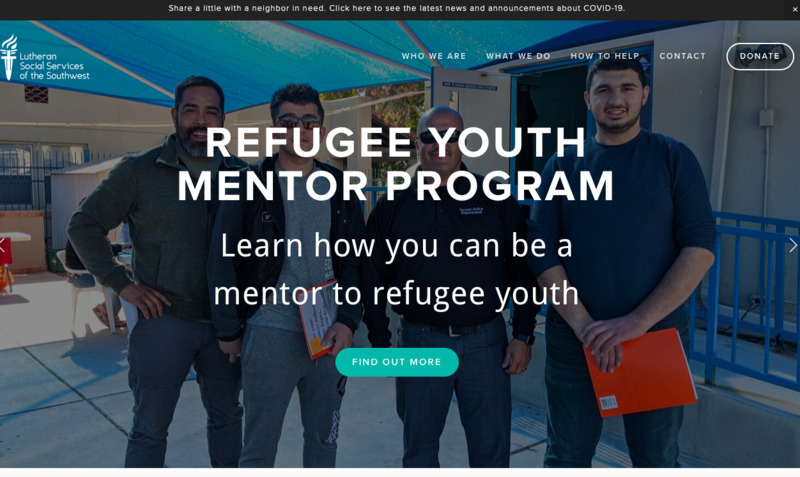 2020-09-14
2020-09-14Lutheran Social Services of the Southwest (LSS-SW)
OUR MISSION We stabilize people during crisis and transition, build a foundation where people can thrive, and preserve dignity and respect for the most vulnerable. OUR VISION A future where all people thrive. OUR STATEMENT OF SHARED VALUES Dignity: We demonstrate through our actions that all people have value and are worthy of respect. Diversity: We recognize and accept the differences among people, fostering an environment inclusive of all. Social Justice: We model and promote a culture of open-mindedness, compassion, and inclusiveness, promoting fairness, justice, and equal opportunities for all. Quality: We commit to excellence, innovation, and continuous improvement through anticipation and dynamic response to opportunities for change. Community Partnerships: We build collaborative partnerships to strengthen individuals, families and communities. Faith-based: We serve all people with an attitude of compassion and caring, recognizing and honoring our Christian heritage of God’s love in Christ for all. -
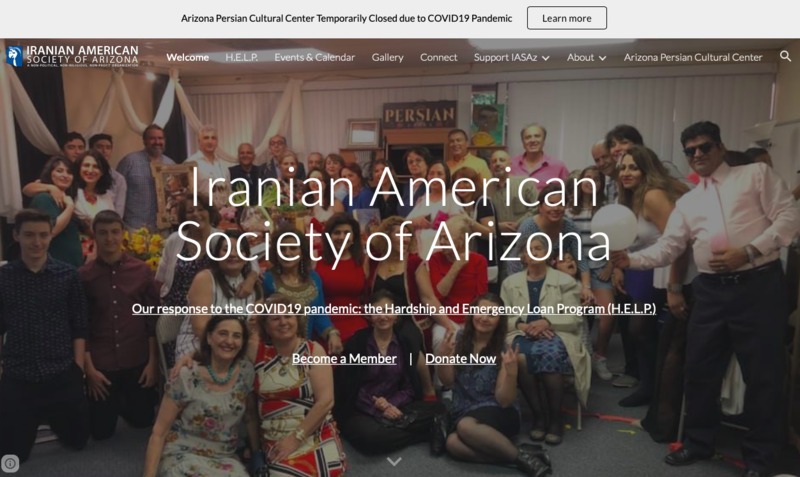 2020-09-14
2020-09-14Iranian American Society of Arizona (IASAz)
At Iranian American Society of Arizona (IASAz), we strive to enrich the lives of Arizona residents by promoting an awareness of the Iranian culture, heritage, language, history and contributions through education, music, dance, theater, arts, food and sense of community. Our goal is to preserve, promote and encourage through education and charitable work, the richness of Iranian-American culture. We achieve this by organizing social, educational, recreational and other functions to promote better understanding and friendship both among the members of the organization and among individuals and organizations in Arizona who share an interest in Iranian culture. -
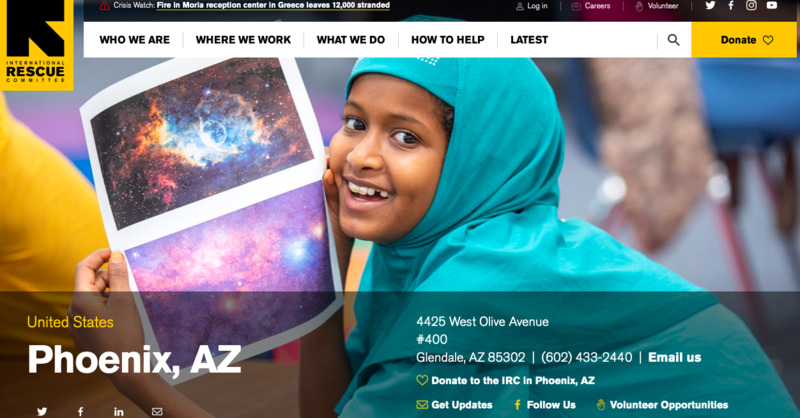 2020-09-14
2020-09-14International Rescue Committee (Phoenix)
The International Rescue Committee helps people whose lives and livelihoods are shattered by conflict and disaster to survive, recover and regain control of their future. -
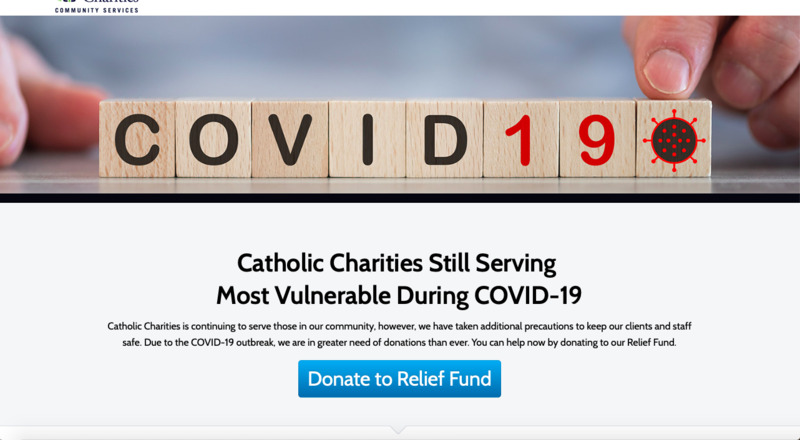 2020-09-08
2020-09-08Catholic Charities of Arizona
Arizona has more than 62,000 refugees, who have been forced out of their country of origin due to persecution of race, religion, nationality, political opinion or membership to a particular social group. These are hard-working, often educated people who are struggling to survive. You can help them be welcomed into our country by helping provide for them as they start to settle. When you partner with Catholic Charities, you’ll help provide refugees with support in getting settled into American culture. -
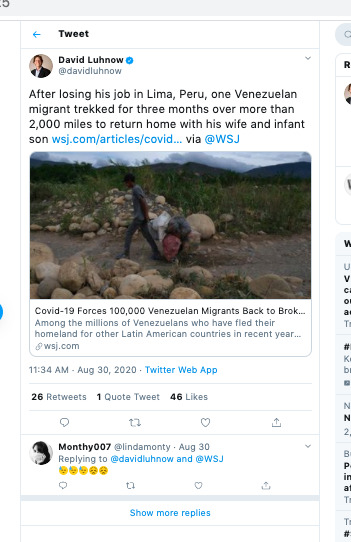 2020-08-30
2020-08-30COVID forces 100,000 Venezuelans back home
Over the past five years, Venezuelan migration to Peru has really picked up. With an impoverished country, political corruption, and sometimes no food, Venezuelans have exited in mass. Now with COVID-19, people have found themselves in dire straits and wishing to reverse migrate. This tweet of a WSJ article captures the story of a father and mother who trekked for over 3 months from Peru to Venezuela with their infant son. -
 2020-05-11
2020-05-11Coronavirus shuts down economy- it's impossible to live in Lima
N/A
